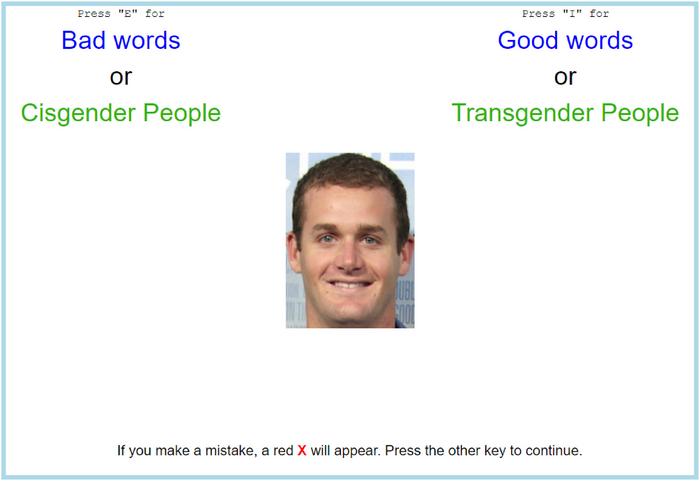By analyzing data from the Harvard Implicit Association Test—a widely accepted measure of a person’s attitudes toward people based on characteristics like race, gender, and sexuality—researchers find that healthcare professionals, and in particular nurses, are more biased against transgender people than are people who are not healthcare professionals. A questionnaire administered before and after the test shows that healthcare professionals are less likely to know transgender people personally and that nurses are more likely to conflate sex and gender identity. These results are reported November 3 in the journal Heliyon.

Credit: Heliyon/Derbyshire et al.
By analyzing data from the Harvard Implicit Association Test—a widely accepted measure of a person’s attitudes toward people based on characteristics like race, gender, and sexuality—researchers find that healthcare professionals, and in particular nurses, are more biased against transgender people than are people who are not healthcare professionals. A questionnaire administered before and after the test shows that healthcare professionals are less likely to know transgender people personally and that nurses are more likely to conflate sex and gender identity. These results are reported November 3 in the journal Heliyon.
The Implicit Association Test works by asking participants to categorize groups of people with “good” words like “nice” or “laughter” and “bad” words like “nasty” or “rotten.” Its results are collected by a team of scientists as a part of Project Implicit since 1998 and are made available for use by the public and other researchers.
To specifically assess the attitudes of healthcare professionals towards transgender people, the researchers focused on a subset of the respondents from 2020 to 2022, including 11,996 nursing healthcare professionals and 22,443 non-nursing healthcare professionals. These responses were compared to 177,810 responses of non-healthcare professionals.
A person’s bias is reported as their “D-score,” which can range from -2 to 2, with higher scores indicating more anti-transgender views. The standard classification for this test lists values over 0.15 as “slightly biased,” and over 0.35 and 0.65 as “moderately” and “strongly” biased, respectively.
Non-healthcare professionals on average reported a D-score of 0.116, which is considered to mean that they have little to no bias. However, healthcare professionals (non-nursing), reported an elevated score of 0.149, which is on the edge of what is considered to be “slightly biased.” The average D-score for nursing healthcare professionals was 0.176, which falls clearly within the range of “slightly biased.”
The participants’ D-score assesses their implicit bias—their true beliefs which they may be too reluctant to share—but their explicit bias, or their self-reported views, were assessed by a questionnaire.
Nursing healthcare professionals were significantly more likely to agree with statements like “I believe a person can never change their gender” or “I think there is something wrong with a person who says they are neither a man nor a woman” compared to other healthcare professionals and non-healthcare professionals.
“Our finding that nurses have higher levels of implicit bias towards transgender people may be related to a tendency to conflate sex and gender identity, as shown by higher levels of agreement with transphobic statements that conflate these two distinct concepts,” write authors Daniel W. Derbyshire (@DWDerbyshire) of the University of Exeter and Tamsin Keay of Coventry University.
The questionnaire also asked about the participants’ relationships with transgender people in their daily lives. While healthcare professionals—including nurses and non-nurses—were more likely to have met a transgender person than non-healthcare professionals, they reported that they were less likely to have a transgender friend or family member.
“This suggests that healthcare professionals’ (both nurses and non-nurses) experience of interacting with transgender people may be largely confined to a work context,” write the authors.
The authors note that the participants in this test are limited to those who visited the Project Implicit website and chose to complete the test. “As such, the sample may be subject to sample selection bias in terms of the demographics and Implicit Association Test (IAT) results of participants,” write the authors. “However, it may be anticipated that people with particularly negative attitudes towards transgender people would avoid taking the Transgender IAT and the results presented here may therefore under-represent the extent of implicit bias towards transgender people.”
###
Heliyon, Derbyshire et al. “Nurses’ Implicit and Explicit Attitudes towards Transgender People and the need for Trans-Affirming Care” https://cell.com/heliyon/fulltext/S2405-8440(23)07970-7
Heliyon (@HeliyonJournal), part of the Cell Press family, is an open access journal publishing scientifically accurate and valuable research across life, physical, social, and medical sciences journal. Visit https://www.cell.com/heliyon. To receive Cell Press media alerts, contact [email protected].
Journal
Heliyon
DOI
10.1016/j.heliyon.2023.e20762
Method of Research
Survey
Subject of Research
People
Article Title
Nurses’ Implicit and Explicit Attitudes towards Transgender People and the need for Trans-Affirming Care
Article Publication Date
3-Nov-2023




